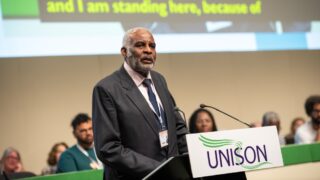- Conference
- 2023 National Delegate Conference
- Date
- 15 February 2023
- Decision
- Carried as Amended
Conference notes that health inequalities in the UK, that were already unacceptably large, have intensified in recent years.
Conference notes that one of the most measurable demonstration of such inequalities is the “social gradient in health” which outlines differences in life expectancy for different groups of people.
For example, women living in the least-deprived 10 percent of areas have a life expectancy of 86.4 years, which is nearly eight years more than the 78.7 years expected for those in the most deprived 10 percent of areas. The gap is even wider for men, with a difference of more than nine years between the life expectancy for those in the least-deprived areas (83.5 years) and the most deprived (74.1 years).
Conference is alarmed that these gaps are growing larger for both women and men. Even more starkly, for the poorest in society the overall growth in life expectancy, which had been a decades long trend before 2010, has now gone into reverse. A 2021 study by The Lancet found that, even before the Covid pandemic hit the UK, many parts of the north and other urban areas had seen life expectancy fall over the past decade.
Conference believes that it is no coincidence that such trends have occurred at a time of biting government austerity. This has affected the quality of people’s homes, their diets, their ability to exercise, their mental health and also their ability to access healthcare services, given the restrictions that even the NHS has had to endure over this period.
Conference is also deeply concerned that public health services, which have the potential to help relieve health inequalities, have suffered substantial funding cuts over the past decade. For example, public health grant allocations were cut by nearly a quarter between 2015/16 and 2021/22.
In addition, Conference notes that Covid-19 has had an unequal impact on different population groups and has exacerbated health inequalities. Mortality rates from Covid have been higher in more deprived areas, contributing to widening disparities in life expectancy between the most and least deprived sections of society.
But Conference notes that health inequalities are not restricted to differences between socio-economic groups; they also affect women and our Black, disabled and LGBT+ communities.
Conference believes that health inequalities are not inevitable; evidence shows that a comprehensive joined-up approach to tackling inequalities can yield results. Putting a definitive end to austerity and guaranteeing proper investment in our public services should be the starting point.
Conference therefore calls on the National Executive Council to:
1)Highlight the increase in health inequalities and disparities in life expectancy in the union’s campaigning in health and other areas;
2)Campaign to put an end to the increase in health inequalities for those from the most deprived backgrounds and other groups in society;
3)Continue to campaign in the strongest terms for no return to austerity and proper investment in our public services, including public health.





